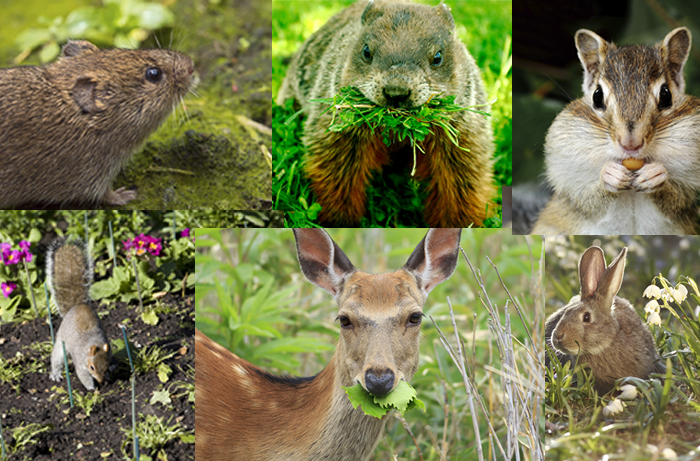Safely Deter Animals In The Garden

Gardens bring many welcome surprises, but plant damage from animals in the garden is not one. In many growing areas, foragers dine all year. How do you safely deter them? Read on for tips.
What Animals Are Damaging My Garden?
Some animals dine in your garden “after hours” and some take cover while they devour your plants. Given this, identifying a diner for each plant injury is not likely. However, it is helpful to know which animals play major roles in garden destruction, so you can take action to deter them.
Deer: Their “browsing” results in torn and ragged edges, since deer tear plants with their lone bottom teeth. Tree “girdling” is the male’s calling card – he rubs his antlers to remove velvety growth and claim territory. This shreds the bark, leaving the tree vulnerable to serious harm.
Chipmunks: Small holes in lawns, on paths and walkways, and along edging are the handiwork of chipmunks. Typical behavior includes uprooting bulbs and flowers, and noshing tender plants.
Groundhogs: Also known as woodchucks, these members of the squirrel family eat virtually every type of plant. They live in burrows which add another threat to your property – large holes around lawns and plantings.
Rabbits: They generally dine on low-growing plants, leaving a distinct 45-degree cut with their teeth. In addition, rabbits often go several feet up tree trunks and girdle them, causing “ring barking”.
Squirrels: Masters of the “gnaw”, squirrels sample everything they encounter, so their contribution to destruction goes beyond plants. Squirrels do significant damage to birdfeeders, decks, and other building structures.
Voles: Their widespread damage belies their small size. Voles eat many plants, girdle shrubs and trees, and destroy golf courses, ground covers, and lawns. They dine on root systems in underground tunnels, leaving plants destroyed in their early stages.
For more details, including visual examples of damage, visit our guide on what pests are in your yard.
Remove Food Sources
Eliminate invitations to animals, such as bird feeders, compost, pet food, unsecured garbage, and produce. Control lawn grubs, as they are a big draw for voles. Keeping your yard free of food sources will bolster your efforts for deterring animals in the garden.
Put A Coat On Your Plants!
Coat and protect plants with safe, eco-friendly Bobbex Rabbit and Small Animal Repellent, an on-plant formula that drives away animals naturally with unpleasant tastes and smells. The odor will only be evident to people for 24 hours, but will repel garden intruders for a long time.
Are deer the primary diners in your yard? #1 Rated Bobbex Deer Repellent will shield plants, shrubs and trees from these champion feasters.
All Bobbex repellents are easy to apply, dry clear, are long-lasting, and safe for people, pets, wildlife and aquatic life.
Add Beautiful Borders
Surround your cherished plantings with living “walls” of plants that deer tend to avoid. What could be better than boundary protection in the form of natural beauty? This list of plants rated by deer resistance can help you choose varieties least likely to be nibbled by deer, the most determined garden diner.
Uninvite The Animals In The Garden
Your garden should not be engulfed in a horde of hungry herbivores. There are many ways to keep animals out, as well as tactics for ushering them away should they sneak in. Follow the tips offered in this blog and add some of your own methods. Keep animals out and garden beauty in!
